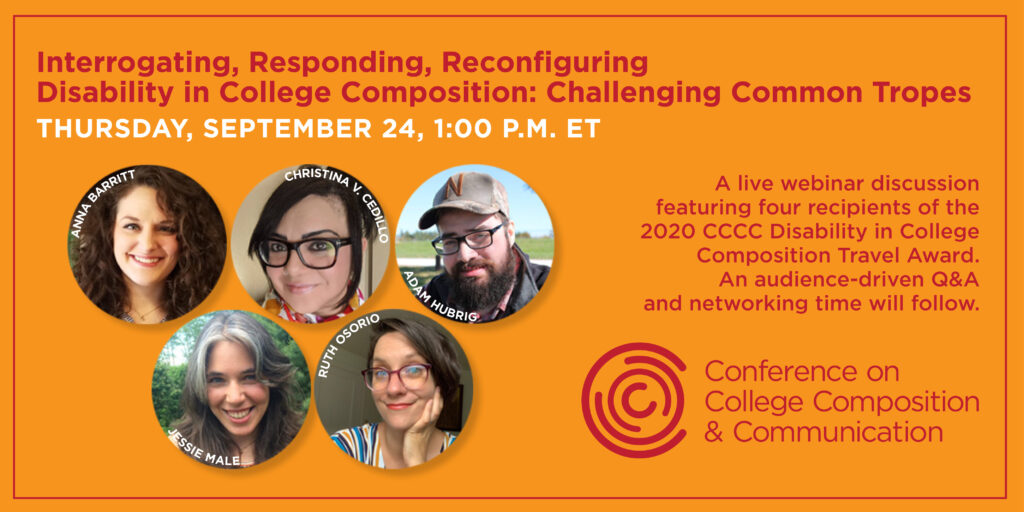Thursday, September 24, 2020
1:00–2:30 p.m. ET
View the webinar recording
While this recording is available to everyone, you will need to login into the NCTE site to view the video (there is no cost to create a login). To view this video with closed captioning, hover over the bottom right of the video and click “CC” and “English.”
This panel features four recipients of the 2020 CCCC Disability in College Composition Travel Award. An audience-driven Q&A as well as networking time will follow the presentations.
Presenters:
Anna Barritt, University of Oklahoma
“When UDL Isn’t Enough: Navigating Institutional Barriers to Access”
Universal design for learning is critical for creating an accessible and inclusive classroom environment, but writing instructors are often left with insufficient resources and guidance for supporting students with disabilities beyond access to class content. This presentation documents one administrator’s journey in making a writing program more widely accessible, including the failures, successes, and lessons learned.
Adam Hubrig, Sam Houston State University
“Eugenic Ideologies in Composition’s Past and Present”
As composition studies was forming in America, so were eugenic ideologies. This presentation explores how eugenic ideology continues to shape conversations about composition.
Jessie Male, The Ohio State University and NYU Gallatin
“Building a Community of the Sick (Or Why You Should Read the Acknowledgments)”
This presentation will address the teaching of pain memoirs, specifically Porochista Khakpour’s Sick, Sonya Huber’s Pain Woman Takes Your Keys and Other Essays from a Nervous System, and Esmé Wang’s The Collected Schizophrenias. These texts demonstrate a veritable shift within the genre of disability memoir by capturing disability identities and experiences that don’t adhere to a social model—writing that both indicates disability pride and a desire for cure. The presentation focuses on how the utilization of these memoirs in the classroom complicate popular understandings of disability as enforced isolation, potentially shifting students’ relationships with their own bodies and communities, inviting them to consider disability as transformative and rooted in care.
Ruth Osorio, Old Dominion University
“Inviting Human Frailty into the Academic Conference: An Analysis and Oral History of the CCCC Access Guides Authors”
This presentation examines the rhetorical work that goes into composing genres that enact access within professional settings. Furthermore, the presented will discuss how these guides enact access as an ongoing rhetorical project, in which a community welcomes, values, and makes space for the presence of human frailty.
Moderator: Christina V. Cedillo, University of Houston-Clear Lake
Respondent: Jay Dolmage, University of Waterloo
Share your learning on Twitter at #4Cchat.


